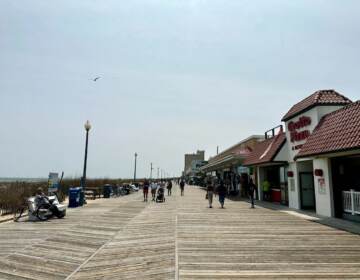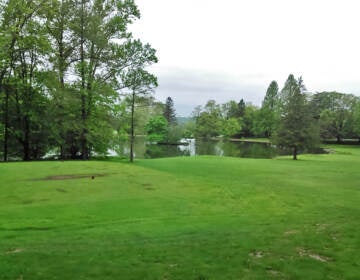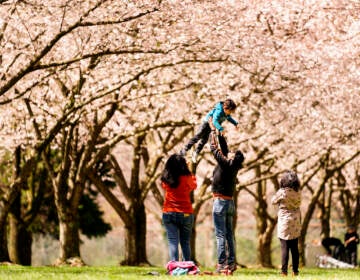How to survive a summer without city pools? Open streets for play, says Philly Parks Commissioner
With city pools closed, Philly’s parks commissioner wants to expand Playstreets, a summer program that closes neighborhood streets to traffic.
Listen 1:51
Yvanna, 13, (right), and Emilia, 12, (left) play with soccer balls on their block. (Kimberly Paynter/WHYY)
Are you on the front lines of the coronavirus? Help us report on the pandemic.
Migdalia Sanchez’s two youngest daughters spend all their free time playing soccer. As part of the Kensington Soccer Club, they play in indoor and outdoor leagues all throughout the year.
When they’re not in the field, they kick the soccer ball around in parks and playgrounds.
“They live, eat, breathe soccer,” Sánchez said of her daughters, 12 and 13.
With training and games postponed because of the coronavirus, Sanchez, a working single mom of five, has had to keep them inside their Port Richmond house playing on screens since March.
She doesn’t even want to imagine what it will be like if they can’t go out and play during the summer.
“That would affect us because it means I now have to figure out how to entertain two teenage girls,” Sanchez said. “And that could be tough.”
This summer will be challenging for many. Mayor Jim Kenney has said public pools won’t open this season and playgrounds, splash pads, recreation centers, athletic courts and summer camps will only open when it’s safe, with reduced hours and limited access.
Without these everyday destinations and with new restrictions at museums, youth-oriented businesses, nearby campgrounds and beaches, keeping kids cool and active during this summer is going to be hard — especially for working parents.
“In the hot days, this is gonna be a catastrophe,” said Charito Morales, a community organizer at the Providence Center.
The center offers summer camps and activities to the predominantly Latino community in North Philadelphia. Morales, who is in touch with about 200 families in Kensington, said parents are already asking what they are supposed to do with their kids if everything is off-limits because of the virus. She especially worries about families without access to outdoor spaces, air conditioners, or nearby parks.
“These kids, in the front of their houses, all they have is needles and trash,” Morales said. “They live in Kensington, they don’t have a lot of options. They don’t know what to do if they close down the swimming pools in the park.”
Playstreets as a salvo to painful Parks Dept. cuts
Parents are not the only ones frustrated with the restrictions. Philadelphia Parks and Recreation Commissioner Kathryn Ott Lovell is also devastated.
“To be really honest, in the very, very first few weeks of this crisis, I felt really optimistic,” she said on a recent webinar hosted by the Urban Land Institute and the National Recreation and Park Association.
The outpouring of support for parks and public space, the way people started really appreciating how essential parks are, gave her hope, Ott Lovell said.
“And then … stuff got real,” she said.
To make up for the $649 million city budget gap caused by the pandemic, Ott Lovell had to cut 20% of the Parks and Rec budget, or $13 million. Some of the cuts include eliminating summer programs such as the concert series at Dell Music Center, removing 1,300 seasonal positions, reducing hours for part-time workers and not filling vacant positions.
Especially painful was reducing hours at rec centers, neighborhood amenities that the Kenney administration has tried to bolster through its Rebuild initiative.
Fears of spreading the coronavirus are one of the reasons behind the decision to close the city’s 74 public pools, but the commissioner said the bigger factor was the budget crisis. The Centers for Disease Control and Prevention’s recommendations for parks and public spaces administrators is to keep pools properly cleaned and disinfected, not to close them.
“Our capital budget next year will be $1.5 million. It’s just… laughable” Ott Lovell said. “It does show you that … we’re still not really seen as an essential service when it comes right down to what’s going to be funded in a time of crisis.”
Still undecided is the fate of the 130 city summer camps that serve an estimated 7,500 youth in Philly.
With city pools closed, camp options likely reduced, if not canceled, and rec centers limited, Ott Lovell is looking to Playstreets, a summer program that closes about 450 city streets to traffic from 10 a.m. to 4 p.m. and provides lunches or snacks for children and teens.
While city officials have so far resisted calls to expand the number of streets closed to traffic for pedestrian use during the pandemic, they are considering an expansion of Playstreets.
Residents can now apply for their street to be a Playstreet, by emailing or calling about the program.
Ott Lovell said the program will allow the Parks Department to meet the kids where they are.
“So we’re now focusing on how we can enhance those Playstreets and ensure a really wonderful, positive, structured play experience with play captains and play kids and amazing mobile play elements that sort of transform the street landscape,” Ott Lovell said.
Ott Lovell is working to solve a problem that is plaguing cities nationwide. Summer plans remain on hold or canceled in most parks and recreation agencies across the United States, according to the National Recreation and Park Association. And most of them are having to cut their budgets.
“Nearly half of all agencies have received requests to make cuts to their current fiscal year budget, and that budget cut has been on average up to 20%,” said Rachel Banner, director of park access at NRPA. “We’re also finding that about 30% of agencies are already making cuts to the next fiscal year budget, and we know that this will likely continue along these trends.”
Fire hydrants, kiddie pools and patience
But there is no one-size-fits-all solution when it comes to children. For many families, the summer will demand new routines and a lot of creativity.
Jehahn Young — a mother of three kids ages 16, 10 and 7 — is among those trying to figure out what’s next for her family. Young works full-time as a social worker for an insurance company. In the summers, she sends the two oldest to camp and the youngest, who has autism, to a play gym for kids with special needs in Northeast Philadelphia, or to the city’s Carousel House in Fairmount Park, which has a pool and programming for people with disabilities.
“But I won’t have that option this summer and it’s very scary for me,” she said.
Young doesn’t know how she will keep her kids active this summer. She’s an advocate for kids with special needs and said Playstreets is not a solution for families like hers.
“If you have to work, you cannot spend time outside with your kids during those Playstreet times, especially if your kid is a wanderer or, you know, they need you to help them engage in those activities,” Young said. “Some parents have kids who have seizures or they’re on various medications and they can not be outside for long periods of time.”
Young said she’s going to buy a pool for her deck and get creative.
Charito Morales recommends taking kids to nearby parks, community gardens and checking with community centers to see what they’re offering. The Providence Center, she said, will still do some programming outside while limiting the number of kids participating at one time.
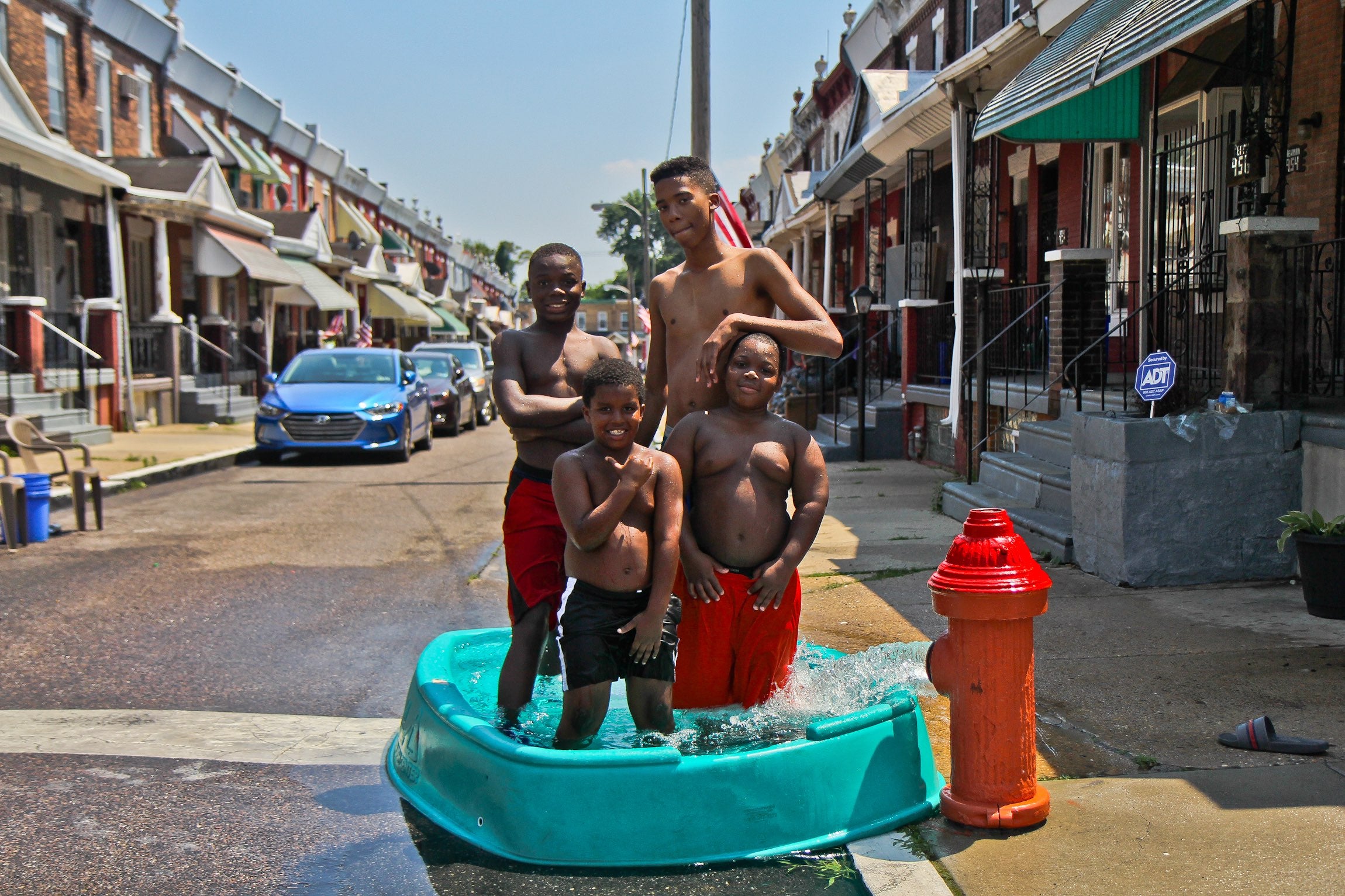
Shawn Banks has a 13-year-old son and an organization to keep kids in Kensington out of trouble by engaging them with sports. He said this summer is going to be hard for everyone, as social media can only do so much.
His solution: encouraging kids to exercise in a backyard, on a porch, or on the sidewalk.
To keep them cool? Take a water hose and water them down outside, or set up sprinklers in the yard, Banks said. If all else fails, there’s always that time-tested rite of summer in the city, he said.
“We all know about that fire hydrant on the corner. It’s too hot, we’re gonna open it up and let the water just go wherever it needs to go,” Bank said with a laugh. “That’s been a lifelong thing in the ’hood that we used to grow up on. So yeah, they’re going to open them up.”

WHYY is one of over 20 news organizations producing Broke in Philly, a collaborative reporting project on solutions to poverty and the city’s push towards economic justice. Follow us at @BrokeInPhilly.
WHYY is your source for fact-based, in-depth journalism and information. As a nonprofit organization, we rely on financial support from readers like you. Please give today.



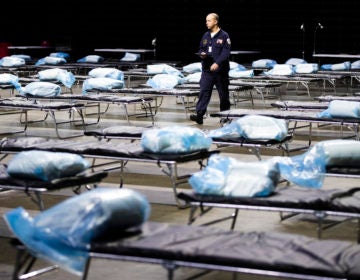
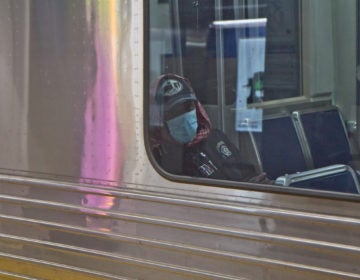

![CoronavirusPandemic_1024x512[1]](https://whyy.org/wp-content/uploads/2020/03/CoronavirusPandemic_1024x5121-300x150.jpg)
